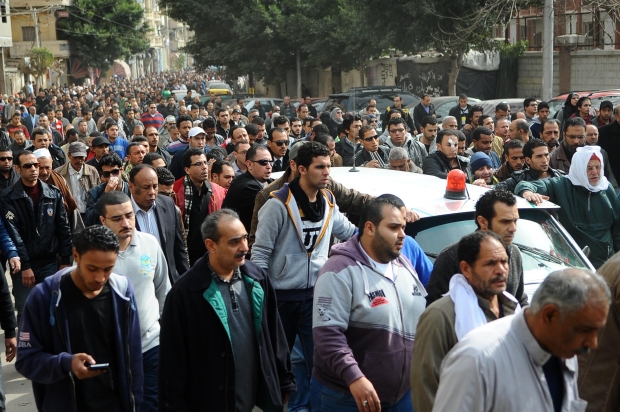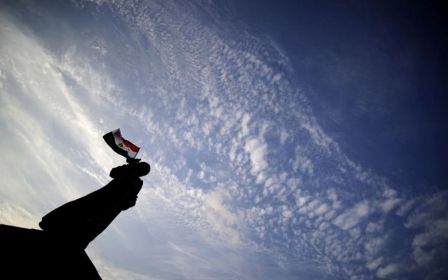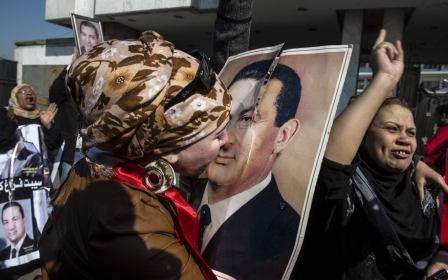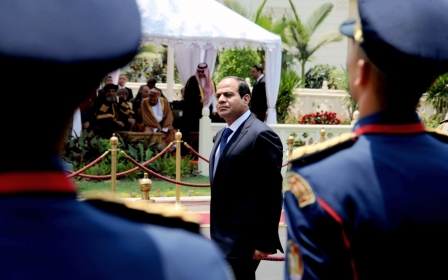Egypt's opposition calls for 'return to revolt' on uprising anniversary
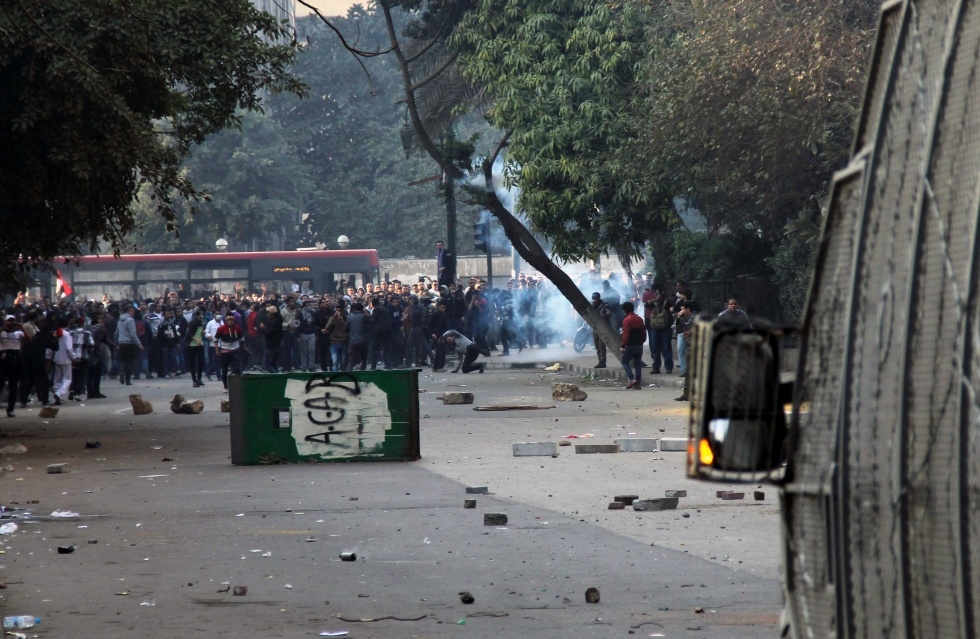
The fourth anniversary this weekend of the 2011 revolution that overthrew former president Hosni Mubarak comes at a sensitive time, amid reports that the long-time strongman leader could be “poised to walk free” from prison, where he was being held on charges of corruption and colluding to kill protesters.
This year is also the first time Egypt will recognise the occasion with former army chief Abdel Fattah al-Sisi as the country’s president. Sisi cancelled official celebrations after the death of the late Saudi king Abdullah Bin Abdulaziz, described by Sisi as a “great and loyal man”. Saudi Arabia and Egypt have been strong allies since the 2013 ouster of Muslim Brotherhood president Mohammed Morsi, and Sisi declared a week of mourning after the king’s death on Thursday night.
Though state celebrations were scrapped, protesters have marched in many districts across the country, and a huge deployment of security forces turned the streets of Cairo into a “military barracks” on Sunday morning, according to activists. Two protesters were killed, allegedly at the hands of police, in the 48 hours leading up to the resonant date.
Marking the anniversary of the revolution, Sisi gave a televised speech in which he paid tribute to up to 300 people killed during the 2011 uprising, as well as those who have died since.
“I express my respect and pride for the martyrs of Egypt who have died since 25 January up until now. They died for Egypt so that it might remain and progress.”
Memories of the 'martyrs' and fears over police impunity
As Egypt’s fragmented opposition prepared to mark the resonant date of 25 January, when street protests started four years ago, many were shocked by the deaths of more activists, allegedly at the hands of security services.
Sondos Rida Abu Bakr, 17, was killed on Friday during a demonstration in Alexandria. The outlawed Muslim Brotherhood, of which she was a supporter, alleged that she was shot dead by security forces.
The following day, activist Shaimah al-Sabbagh was killed in Cairo. She had travelled to the capital from Alexandria with the Popular Socialist Coalition to lay wreaths for the revolution’s “martyrs” in the city’s iconic Tahrir Square.
Fellow protesters say that security services used birdshot to break up the demonstration of around 20 people as they walked towards the square. Pathologists later said Sabbagh was hit in the back from a distance of about eight metres.
Images purporting to be from the demonstration show black-clad police officers armed with large weapons.
The Interior Ministry has denied that she was shot by police, warning Egyptians against attending protests that could be infiltrated by “terrorist groups”. The ministry has said it is investigating the killing.
The pictures, as well as a video showing a fatally wounded Sabbagh being carried from the scene by a fellow activist, have shocked many, especially coming as it did on the eve of National Police Day on 25 January.
Back in 2011, opposition groups organised a “Day of Rage” on that date to protest against police impunity.
Now, many activists fear that a similar climate of indemnity persists - President Sisi acknowledged on Tuesday that police had committed rights abuses, but that they were to be expected in the light of the "exceptional" situation Egypt finds itself in.
Activist Amal Haddad on Saturday put out a call on Facebook for “everyone who does not want the revolution to die” to publish pictures of Egypt’s “martyrs”. Many have used the forum to post Sabbagh’s image, calling for “retribution”.
Also commemorated, with the message “we will not forget”, was Khaled Said, whose alleged beating to death by police in June 2010 sparked a mass wave of anger.
Hadad, who set up the Facebook page, wrote that “if pictures of the martyrs were put up in public squares like images of election candidates, people would know what revolution means, and what it means to die for revolution.
“The military, the Muslim Brotherhood, the felul [supporters of the old regime] and the Interior Ministry shed blood and trampled over rights to gain power. Retribution for the martyrs".
'Bread, Freedom and Social Justice'
During his commemorative speech, Sisi urged Egyptians to continue the 2011 revolution, but this time to look “within themselves” for answers.
“The revolution always pushes us to change … To change ourselves, in our work, at school and at the factory.
“There is no doubt that negative aspects remain … and we must overcome these by changing ourselves in order to achieve the goals of the revolution".
In their statements to mark the occasion, many opposition groups agreed with the message that the 2011 revolution is ongoing, and that more action is necessary to achieve its goals.
The National Coalition to Support Legitimacy, an Islamist group formed after the 2013 ouster of Muslim Brotherhood president Mohammed Morsi, issued a statement urging supporters to continue their struggle.
“It is a long battle against arrogance - the revolution is the will of the people. There can be no withdrawal from the revolution, and no negotiation of its goals.”
April 6, the labour movement many credit with sparking the 2011 uprising, put out a similar statement, saying that “all the things that led to the [2011] revolution are still present. They have returned to their seats, so we must return to the revolt".
Beyond these similar messages, though, there seemed to be little consensus between Egypt’s fragmented opposition - four years on from the uprising, even the anniversary of the revolution itself has become deeply politicised, with infighting between different political groups in the run-up to this year’s memorial.
A host of different and opposing groups organised protests scheduled for Sunday - April 6’s demonstration was held under the title “Ongoing Revolution”.
According to the group, protesters gathered late on Saturday night to see in “the fifth year of the January revolution”. They held up banners bearing the slogan “Bread, Freedom and Social Justice,” the chant that united millions during the 2011 uprising.
However April 6, which in early January launched a bid to unite the opposition, thought to include the Muslim Brotherhood, sought to distance itself from the group in the run-up to the memorial.
“We have not co-ordinated any demonstrations with the Brotherhood, and nor will we,” the group’s senior spokesperson, Mohammed Kamal, said last week. “We are only co-ordinating with revolutionary parties".
Followers of the Muslim Brotherhood, most of whose senior membership are now thought to be in Turkey, have been rocked in recent weeks by reports that it has been in discussion with government officials over a possible reconciliation.
According to sources within the now-outlawed party, it is being offered a return to political life and the release of tens of thousands of Brotherhood members currently detained in Egyptian prisons, in return for acceptance of Sisi as the legitimate president.
Since Morsi’s 2013 ouster, the group has been staunch in its opposition to Sisi, who stood for election in May 2014 after Morsi’s removal and won with over 93 percent of the vote.
Officially, the Brotherhood has always maintained that Morsi is Egypt’s legitimate president, and it has been keen to dispel rumours that the issue is up for discussion with government officials.
Members of Students Against the Coup (SAC), a youth movement that originally grew from a setting of strong Muslim Brotherhood support, said last July that anyone who “dared” to reconcile with the government would be rejected.
Many SAC members, some of whom were among the 13 million people who voted for Morsi in 2012, now say they are disenchanted with the Brotherhood leadership.
Shadi Hamid, an Egypt expert at the Washington-based Brookings Institution, has said the group does not speak “the language of political processes”.
Much of the top-down messaging of the Muslim Brotherhood has focused on political process and reinstating the constitution; by contrast, Hamid says, SAC adopts “a revolutionary youth posture - it’s anti-military, anti-state and protests until the very end”.
Yossof Salehn, an SAC spokesperson, told MEE on Saturday that, despite the dangers of protesting, the group had plans to mark January 25.
“We are still doing things. Almost all of our members took part in the [2011] revolution, where the chants were for freedom, social justice and a humane lifestyle".
After Mubarak was toppled, he says, Egypt was “on the right path, but after the coup everything we had achieved was destroyed. Egypt is in a worse situation now than it was under Mubarak".
“People are being detained haphazardly, students are picked up during their final university exams, workers at cultural NGOs are arrested. It has nothing to do with politics any more.
“On this anniversary, we feel sorrow for everything that was lost - but we will try to make it up".
Additional reporting by Arwa Ibrahim
New MEE newsletter: Jerusalem Dispatch
Sign up to get the latest insights and analysis on Israel-Palestine, alongside Turkey Unpacked and other MEE newsletters
Middle East Eye delivers independent and unrivalled coverage and analysis of the Middle East, North Africa and beyond. To learn more about republishing this content and the associated fees, please fill out this form. More about MEE can be found here.


